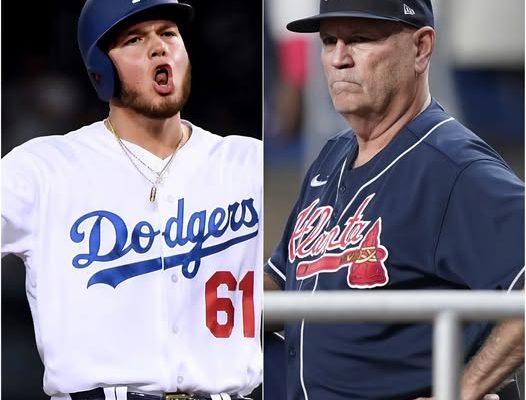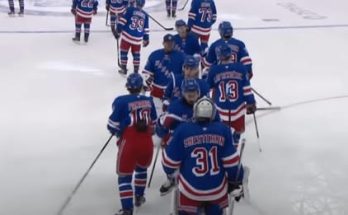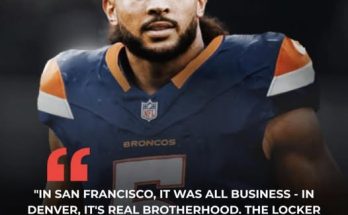In the ever-changing, high-stakes world of Major League Baseball, careers can pivot in a matter of days, sometimes even hours. One such moment has now arrived for Alex Verdugo, the former Los Angeles Dodgers outfielder whose tenure with the Atlanta Braves has come to a sudden and definitive close. The news broke that Verdugo had been released after clearing waivers, a procedural step that ensures no other team was willing to claim him under his existing contract. While this step often marks the end of a chapter for a player, in Verdugo’s case, it represents far more—a moment that encapsulates the unpredictable nature of professional sports, the fleeting nature of opportunity, and the relentless drive required to adapt and survive in baseball’s intensely competitive environment.
For Braves fans, the announcement likely sparked mixed feelings. When Verdugo arrived in Atlanta, it carried the promise of adding depth and a versatile bat to a roster already loaded with offensive firepower. Coming off multiple seasons where the Braves had asserted themselves as one of the most dominant teams in the National League, his acquisition was seen as a potential low-risk, high-reward move. The hope was that Verdugo’s contact-hitting approach, occasional pop, and solid defensive play would mesh well with a lineup built around stars like Ronald Acuña Jr., Austin Riley, and Matt Olson. Yet, like many roster experiments in baseball, the fit never quite materialized in the way the Braves had envisioned.
This isn’t to say Verdugo lacked talent or effort. On the contrary, his career trajectory shows a player who, at his peak, could be a valuable contributor. His early years with the Dodgers displayed flashes of brilliance—patient at-bats, a knack for driving the ball to all fields, and the defensive instincts to patrol both corner outfield spots with confidence. Dodgers fans remember him as part of the blockbuster trade that sent Mookie Betts from Boston to Los Angeles in early 2020, a deal that shifted the competitive landscape of the league. Ironically, that trade also set Verdugo on a path where expectations would follow him relentlessly. In Boston, he proved to be a consistent presence in the lineup but never quite developed into the superstar some thought he could become.
By the time he joined the Braves, Verdugo was in search of a spark—an opportunity to reignite his career on a contending team. Atlanta, for its part, saw the move as a chance to bolster its bench and potentially use Verdugo as a platoon option or injury insurance for its starting outfielders. But in baseball, timing is everything, and Verdugo’s arrival coincided with a stretch in which other Braves players were healthy, productive, and entrenched in their roles. That left him fighting for playing time, often in pinch-hitting situations or sporadic starts, a rhythm that can be challenging for any player trying to find consistency at the plate.
When a player clears waivers, it signals that all 29 other MLB teams passed on the chance to claim him at his current salary. This doesn’t necessarily mean Verdugo is without value—it simply suggests that front offices may be waiting for the opportunity to negotiate a new deal, likely at a reduced cost, without absorbing his existing financial terms. For Verdugo, this moment could open the door to a new chapter, whether in the majors or possibly even abroad, where many players have successfully rebuilt their careers in leagues like Japan’s NPB or Korea’s KBO before returning to MLB.
The decision to release a player is never purely about on-field performance; it’s often a mixture of roster needs, financial considerations, and organizational direction. For the Braves, this move could be part of a broader strategy as they look to maintain flexibility ahead of the trade deadline or late-season call-ups. Atlanta has been aggressive in recent years when it comes to shuffling its roster to maximize postseason readiness, and sometimes that means parting ways with players who simply don’t fit the immediate puzzle.
Verdugo’s release also underscores the unforgiving nature of baseball at the highest level. Unlike in other sports where a star player might be insulated by reputation or past accolades, MLB is a performance-first league. Even a few months of underwhelming results can shift a player’s standing, especially on a roster stacked with talent. For Verdugo, the challenge will be finding the right environment where his skills can be utilized consistently—something that might require a team willing to give him everyday reps and a clear role.
Fans often underestimate how much the mental side of the game influences performance. Changing teams, adjusting to new coaching styles, adapting to different ballparks, and finding chemistry with teammates can all play a role in whether a player thrives or struggles. In Verdugo’s case, the constant transitions in recent years—from Dodgers to Red Sox to Braves—may have prevented him from settling into the comfort zone that allows athletes to perform at their peak. While some players thrive in new settings, others need stability to build confidence and momentum.
It’s worth noting that Verdugo’s story is far from over. At just 28 years old, he still possesses the tools that made him a highly regarded prospect a decade ago. His ability to put the ball in play, his defensive versatility, and his baseball IQ are qualities that many teams value, especially in an era where strikeouts are high and defensive metrics are scrutinized heavily. A contender in need of a left-handed bat could see him as a fit for a bench role, while a rebuilding team might be willing to give him regular playing time to see if he can rediscover the form that once made him an everyday starter.
If there’s one constant in MLB history, it’s that players who are willing to adapt and persist often find a way back. Journeymen outfielders have been known to reinvent themselves—adding power, improving plate discipline, or refining defensive positioning—to carve out new opportunities. Verdugo could very well follow that path, using this release not as a career-ending setback, but as motivation to retool his approach and prove his worth once more.
The baseball calendar moves quickly. As Verdugo’s name fades from the daily Braves updates, the rumor mill will inevitably turn to where he might land next. Some insiders will speculate about a return to the American League, where the designated hitter role could give him more at-bats without the wear and tear of daily outfield duty. Others might point to smaller-market teams looking for inexpensive veteran leadership to guide their younger players. And of course, there is always the possibility of a late-season signing by a playoff contender seeking depth in anticipation of October’s grueling battles.
For now, Verdugo will likely take stock of his options, weighing the benefits of immediate playing time against the appeal of joining a team with championship aspirations. Whatever path he chooses, his journey serves as a reminder that in baseball, the line between starter and free agent can be thinner than most realize. It’s a sport that demands resilience, adaptability, and a willingness to embrace uncertainty—a truth that Verdugo is now experiencing firsthand.
In the bigger picture, this move by the Braves may ultimately be remembered as a minor roster adjustment in their 2025 campaign. But for Alex Verdugo, it is a pivotal moment—one that will shape how the next phase of his career unfolds. Whether it’s with another MLB team, overseas, or perhaps in an unexpected role, the next decision he makes will be crucial in determining whether he can once again establish himself as a reliable contributor at the highest level of the game.
Baseball history is filled with examples of players who have endured similar setbacks, only to return stronger and more determined. If Verdugo can channel that same determination, refine his approach, and find a team that believes in his skill set, there is every reason to believe this is not the end, but rather the turning point in his professional story. In the high-pressure, constantly shifting world of Major League Baseball, sometimes the breaking point is exactly what a player needs to break through.



